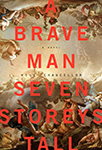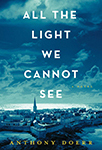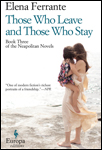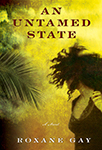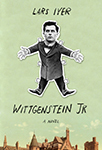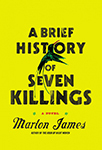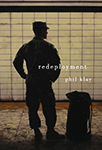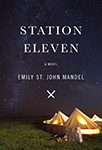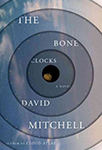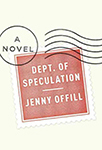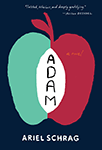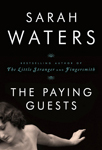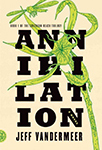by Jesse Ball
30% OFF at Powell’s »Alice Sola Kim: Station Eleven and An Untamed State are immediately similar in two respects, in that they deal with people grappling with the aftereffects of trauma, and in that I had already read and loved both books prior to participating in the Tournament of Books. So it’s just wonderful, especially super-great for me to be pitting the two against each other, and I don’t at all feel like hurling.
Roxane Gay’s An Untamed State is the story of Mireille Duval Jameson, a happy and privileged Haitian-American woman successful in all things—love, career, family—who is kidnapped for ransom during a trip to her father’s Port-au-Prince estate. She is held for 13 days, during which she is continually raped and tortured by a gang of men. When the ransom is paid and Mireille is freed, she is left traumatized and unfamiliar to herself, alone in the world despite her family and loved ones.
What really struck me about An Untamed State is that there are no skipped steps. You don’t skip over what Mireille endures. You know what happens and what parts of her hurt. There are many pitfalls to writing about people who have been brutalized. Sometimes details get glossed over, because the word “rape” alone is intended to tell you everything. At the other end of the spectrum, too many details make crumpled paper dolls out of people, and then the brutality becomes the point, not the people. But in An Untamed State, Mireille is always the point. Her charmed life up to her kidnapping is shown in full, so you know who she was before and what she has to lose. You see everything that happens to her during her captivity: what she goes through, and how she absolutely must change in order to survive it.
Then Mireille gets out and there’s still more than a third of the book to go. This is another aspect of An Untamed State that I truly admired: how it makes it so clear that freedom isn’t free and healing is hell, too.
“I’m sorry I have to do this,” Evelyn said softly, “but I will be as careful as I can.”
I was so sick of sorry. Slowly, I began to inch my legs apart, my body opening. Evelyn gently placed each of my heels into the stirrups. She began to explain what she was doing but I couldn’t hear. I couldn’t care. It hurt more than I expected but I didn’t know how to say anything. I didn’t know how to say stop, please, stop.
There is nothing I cannot take.
Throughout, the prose is blunt and dynamic, unadorned and action-movie-propulsive, carefully describing power dynamics and the emotional frequencies of its characters with an effective simplicity. Occasionally it can feel clunky and stagey, especially the dialogue, peppered with infelicities such as “A beautiful body deserves a beautiful bikini” and “unhand me.” I felt this most when Michael, Mireille’s husband, was involved, and I wondered if maybe the book was addressing something with regards to the romance genre or fairy tale tropes (Mireille’s life is compared to a fairy tale in both the jacket copy and the book itself), but I don’t know.
Related to that, the few parts of the book told from Michael’s point of view are not as good as the rest. Yet they do serve an important purpose that exemplifies the generous and expansive spirit of the book: evincing sympathy for those who are close to people who have undergone trauma.
This is this spirit that makes An Untamed State such a moving and hopeful read, not only an unbearable one. It is what brought me to tears while reading, but kept me at it—so much so that when my worried boyfriend approached, I waved him away like I had the Georgia flu and shrieked, “It’s OK! It’s a book! Let me finish!”
And speaking of.
Station Eleven by Emily St. John Mandel takes place before, during, and after a deadly flu pandemic (the aforementioned Georgia strain), and follows a constellation of intricately connected characters: a movie star, his former best friend, his ex-wife, a former paparazzo/paramedic, and a post-apocalyptic traveling band of Shakespearean actors.
It was a pure pleasure to read something so finely made, something that swept me through so many years and characters and milieus without a single catch or bump. Station Eleven contains Hollywood gossip and flu outbreaks and theatre troupes, but it’s never a mess. The tone throughout is consistent—nostalgic yet fully alive to the fragility and beauty of the world—and each narrative strand serves the whole: the badass knife-throwing actress Kirsten Raymonde wanders a transformed world performing Shakespeare without knowing that she’s obsessed with the same comic book series, given to her by the famous actor who died right before the Georgia flu changed everything, as the deranged prophet causing trouble from town to town. And so on.
I felt completely taken care of while reading Station Eleven, that rare and delicious sensation I’ve had during so many books and films I’ve loved. Dots are connected; stories are rivetingly spun outward and back in again. With masterful shifts in perspective, the book zooms in on one tiny life or zooms out to casually state that commercial air travel would end in two weeks. Like a snow globe, it gave me the pleasure of being able to survey the whole of something beautiful from the outside:
Clark had always been fond of beautiful objects, and in his present state of mind, all objects were beautiful. He stood by the case and found himself moved by every object he saw there, by the human enterprise each object had required. Consider the snow globe. Consider the mind that invented those miniature storms, the factory worker who turned sheets of plastic into white flakes of snow, the hand that drew the plan for the miniature Severn City with its church steeple and city hall, the assembly-line worker who watched the globe glide past on a conveyer belt somewhere in China.
The apocalypse in Station Eleven is a pretty gentle one, as apocalypses go. In some respects, this was refreshing. Not everything has to end with cannibalism-diarrhea-gangrene. And because Station Eleven is a post-apocalyptic novel not about those things, it is free to be about other things—the things we’ll miss about that old and ostentatious world, the things we use to rebuild a new one. We can prioritize beauty and comfort, connection and goodness.
But it also means that it didn’t seem that hard to be good in the world of Station Eleven. Accordingly, the element that didn’t really work for me was the prophet, who seemed stapled in to serve as a random bad guy (despite the ways in which he is connected to the other characters). On the whole, the book felt anesthetized from its own emotions; everyone seemed to be looking back on everything through a thick pane of crystal even as it was happening. Even pain and sorrow weirdly almost felt good, bittersweet at worst.
Now, I love feeling good, and I love to feel good while reading a good book. I’m thrilled that Station Eleven exists. I’m thrilled that both of these books I’m judging exist. But if I have to pick one? I’m going with the one that’s a breathless gasp of pain. The one that is a gasp that gradually, painfully slows and adjusts itself to the rhythms of normal life as you root for it all the way. Because when I remember Station Eleven, I think more about things and tableaus, not about people. But I remember the woman at the heart of An Untamed State, and I won’t forget her soon.
I have no doubt that Station Eleven could make for a gorgeously constructed, glittering Swiss-clockwork Zombie, and if that happens I will give it one of those hearty but cautious human-to-Zombie high-fives. But right now, here’s to An Untamed State.
Elliott: Well, Laura, here we are in the commentary booth. You and I have been friends for a long time and we always talk about books, so it feels pretty natural to talk about them here, at virtual courtside. I always think of myself as a reader first, a writer second. And when I was a kid, my parents referred to me as “the critic” because I always had an opinion about everything I read. That suggests that I was an obnoxious child, but I was actually deeply shy. I only expressed those opinions at home!
Laura: Yes! Very excited to be in the commentary booth this year, especially since I get to hang out courtside with you, Elliott, though I am pretty sure we were opposite readers as kids. I might have made it through high school without reading anything but The National Enquirer and Kurt Cobain’s biography. But when I did discover fiction later on, it was so incredibly saving for me, and I’m making up for all those non-reading years by loving the heck out of books now.
Elliott: So, getting to the business at hand: I have to admit that I’m surprised by Judge Kim’s verdict. I’m a fan of Roxane Gay—she’s a powerful voice in contemporary letters—but I expected Station Eleven to advance. These are both plot-driven novels—their propulsive plots would make good films—but Mandel’s novel has more texture. The writing has a higher thread count. (I have to give credit to my friend Caitlin Horrocks, author of This is Not Your City, for describing writing in terms of “thread count.”)
Laura: I was also surprised Station Eleven didn’t advance farther, given the novel’s near-universal acclaim. Could we say this verdict is something of an upset? I love upsets, so I’m partly surprised/disappointed and partly excited.
I’m also a fan of both these writers and I really admire the structural ambition of Station Eleven, but to play devil’s advocate, I found myself compelled by Judge Kim’s argument for An Untamed State’s ferocity. So-called “bleak” books get a bad rap sometimes, and I appreciated seeing someone go to bat for the tougher read. So I, for one, am taking this verdict as a victory for the books that give us the “breathless gasp of pain.”
Bleakness aside, I loved this pairing: both books, in very different ways, examine disaster and its aftermath. One argues the post-disaster world is still a beautiful place, the other is less convinced.
Elliott: The day after I finished Station Eleven, I was in the dog park and I looked up at the sky and was startled to see an airplane. I’d been living, for a couple of days, in Mandel’s post-apocalyptic world, where airplanes no longer fly, so I stared at that plane with gratitude and wonder. All this is to say that I’m disappointed that Station Eleven has been booted so early in the tournament.
But I’m glad to see bleakness defended! I’ve been thinking about bleakness lately, because I’ve been rereading a lot of Thomas Hardy, who pushed the Victorian novel into very bleak territory indeed. I admire Gay for not flinching in her work. I’m all in favor of books that don’t coddle readers with easy resolution or “likeable” characters or palatable scenes. I like unsettling fiction and I like bleakness. Mary Gaitskill’s Veronica is one of my favorite contemporary novels and it is a brilliantly painful read. And Atticus Lish’s Preparation for the Next Life, which was published last year, is brutal, but I loved it. It’s a book that has really stuck with me.
And I’m all in favor of dissonance. I tend to prefer books that disrupt harmony in some way. Station Eleven is certainly the more harmonious novel in this round. It’s a book that comforts, despite its dystopian setting. It’s a book you escape into, rather than brace yourself for. You and Judge Kim are right: there’s no “breathless gasp of pain” in Mandel’s book. And yet I found Station Eleven more engrossing than An Untamed State.
Laura: As long as we’re both on the side of bleakness! Whew.
Elliott: There’s a reason we’re friends.
Laura: Station Eleven does offer the reader a more multidimensional world, and one of the great pleasures of the book is the anticipation of how the various threads will crisscross and overlap, and the complete trust in the author's ability to make those intersections happen. You do feel taken care of, as Judge Kim says. It's a very confident novel in that way.
Elliott: Totally. I sat in on a workshop taught by the great Amy Hempel in which she said that when writing fiction, you have to make sure that the events don’t overwhelm the story. What she meant is that beyond the plot, there should be a richer core: what the story is really about. It’s what Vivian Gornick refers to as “the situation versus the story.” There are so many threads in Station Eleven and yet the events don’t overwhelm the bigger story, which is about the power of art as a kind of salvation. An Untamed State is almost all action, in prose that often lacks precision. I love that Gay plays with fairy tale tropes—An Untamed State is an anti-fairy tale that subverts the idea of “happily ever after”—but I longed for more surprise and specificity in the language. I yearned for more modulation in the tone. I wanted the voice itself to be more untamed.
Laura: One thing I find interesting about this pairing, and many of the ToB pairings, is the way they challenge the judges to make a kind of aesthetic declaration and then defend it. What is your worldview? Do you privilege the novel that contains all these glittering multitudes or the novel that tunnels deep into a singular consciousness?
Elliott: Personally, I don’t have a Platonic ideal of the novel. I love sprawling, multi-dimensional books—Jeffrey Eugenides’s Middlesex, David Mitchell’s Cloud Atlas, and Roberto Bolaño’s 2666 spring to mind—and I love taut, spare novels that tunnel deep into a particular consciousness—like, say, Elena Ferrante’s The Days of Abandonment or Kazuo Ishiguro’s The Remains of the Day. My favorite novels are voice-driven. I’m wild about Jenny Offill’s Dept. of Speculation, for example, which was, until Friday’s judgement, also competing in this tournament.
Station Eleven is a completely different kind of book: it’s driven not by voice, but by premise. It’s what I call “fiction-y fiction.” But it’s executed so well. It’s vivid and graceful, it’s well paced. It works on its terms. I agree with Judge Kim that Mandel’s Prophet is a cliché bad guy. But I also found Michael in An Untamed State to be a cliché of a devoted husband.
Laura: Mandel does an awe-inspiring job of managing all the narrative threads. And I like that this book was so wildly popular amidst the ongoing rise of “autofiction” (good lord do I hate that term), à la Ben Lerner and Rachel Cusk and Karl Ove Knausgård, to name a few. Don’t get me wrong, I love those writers, but I don’t love the idea that “fiction-y fiction,” as you put it, is less true somehow.
Elliott: Those writers are so up my alley. I would have loved to see Ben Lerner’s 10:04 in this tournament. I’m always a sucker for books that are about the struggle to narrate our own lives. Anyway, it’s too early to know which books will rise again as Zombies, but given Station Eleven’s popularity, I wouldn’t be surprised if it returns.
Laura: I think Station Eleven could make for a fearsome, knife-wielding Zombie. Even the Prophet would be afraid.
In tomorrow’s match, Christina Bevilacqua decides between Redeployment and Silence Once Begun. We’ll be back in the booth on Friday—see you then!



